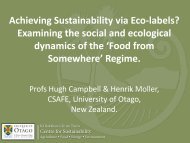Book of Abstract (incl. addendum) - IFSA symposium 2012
Book of Abstract (incl. addendum) - IFSA symposium 2012
Book of Abstract (incl. addendum) - IFSA symposium 2012
You also want an ePaper? Increase the reach of your titles
YUMPU automatically turns print PDFs into web optimized ePapers that Google loves.
Workshop 4.1 ‘Civic food networks’ as driver for sustainable food and farming systems<br />
Convenors:<br />
Chris Kjeldsen, Markus Schermer and Henk Renting<br />
‘Alternative’ food networks have emerged as promising approach for transitions towards sustainable<br />
food systems (in terms <strong>of</strong> environment, social equity and regional development). Many <strong>of</strong> these<br />
embody innovative forms <strong>of</strong> organization that help bridging the gap between producers and consumers.<br />
This workshop focuses on such new forms <strong>of</strong> collective engagement <strong>of</strong> consumers, producers and other<br />
actors as ‘food citizens’ within food networks. The aim is to better understand the associational<br />
mechanisms underlying ‘civic food networks’ and their impact on food and farming systems at<br />
different scales.<br />
Austrian consumer-initiated alternative food networks – the case study<br />
speiselokal!<br />
Juliana Lutz, Judith Schachinger and Sabine Rosenberger<br />
Alpen Adria University, Austria<br />
Julia.Lutz@aau.at<br />
During the last years, several consumer-initiated Alternative Food Networks (AFNs) emerged within<br />
Eastern Austria. Besides providing affordable local organic food <strong>of</strong> high quality, these initiatives aim to<br />
set up a closer relationship between consumers and producers. Furthermore, they support small scale,<br />
local, organic farming (worldwide) as well as new forms <strong>of</strong> civil engagement.<br />
This paper provides a brief overview <strong>of</strong> Eastern Austrian consumer-initiated AFNs, mainly<br />
focusing on an initiative called ‘SpeiseLokal!’ that emerged recently in Lower Austria. SpeiseLokal is<br />
driven by the idea that local, organic food supply can only be sustainable and affordable by being<br />
embedded in new alternative ways <strong>of</strong> social and economic cooperation. Thus, apart from selling local<br />
organic food, SpeiseLokal! is engaged in alternative socio-economic network building, the relocalization<br />
and empowerment <strong>of</strong> people on a broader level. This paper reviews the practical<br />
experiences <strong>of</strong> Speiselokal! and reflects upon SpeiseLokal’s relationship to, and its effects on the<br />
socio-ecological system it is part <strong>of</strong> (farmers, consumers, communities, nature, …):<br />
SpeiseLokal! serves as a plattform were people who are interested in (local) food share their<br />
ideas and activities related to growing/eating/sourcing/distributing local food. Some <strong>of</strong> the consumers<br />
involved simply change their diet or start to exchange recipies, seeds and plants. There emerged<br />
initiatives that focus on community/guerilla gardening. Most recently - inspired and supported by<br />
SpeiseLokal! - farmers as well as consumers are working on setting up a network <strong>of</strong> community<br />
supported farms.<br />
Quality beef in Denmark: What is quality? How does this definition <strong>of</strong><br />
quality affect farming systems?<br />
Florence Bedoin, Troels Kristensen and Egon Noe<br />
Aarhus University, Denmark<br />
Florence.Bedoin@agrsci.dk<br />
Danes are some <strong>of</strong> the highest consumers <strong>of</strong> meat in Europe, yet the market is characterized by highly<br />
homogenous and standardized meat sold pre-packed in supermarkets.<br />
Differentiated meat products and channels have been emerging (and disappearing) in the last<br />
decade. They are driven by different groups <strong>of</strong> actors relating to various value sets: citizens (animal<br />
welfare, landscape and biodiversity conservation), farmers (farm economy and animal welfare), artisan<br />
butchers (good handicraft), public authorities (biodiversity conservation).<br />
In this paper we will look at 6 “alternative” beef meat food networks. The focus will be on their<br />
organization and negotiation around their values and how this impact on the communication from<br />
69











